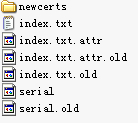一:下载
使用的是0.9.8
1:openssl下载,http://www.openssl.org/source/
2:安装vs2010,并安装
3:下载perl,http://www.activestate.com/ActivePerl,并安装。
二:安装openssl
1:解压到系统盘C:openssl-0.9.8v
2、配置WIN32环境
打开CMD命令行,进入C:openssl-0.9.8v目录,执行命令
perl Configure VC-WIN32
注意区分大小写
3、进入VC BIN目录,配置VC环境变量
进入VS安装路径VC/Bin目录下,运行:
VCVARS32.BAT
设置环境变量。
4、返回OpenSSL目录,创建makefile文件
msdo_ms
该命令不执行汇编语言编译,如报告文末错误,可以尝试msdo_masm(使用汇编语言)、msdo_nasm、msdo_nt等,这几个配置文件是针对不同的系统配置写的批处理。
5、在Openssl目录下,执行编译
nmake -f ms tdll.mak
最终编译动态库完成后,输出都在out32dll目录下:包括可执行文件、两个dll 和两个lib文件: libeay32.dll, libeay32.lib, ssleay32.dll, ssleay32.lib,如果使用VS/VC编程只需按照下文的方法进行即可,如果需要使用openssl命令,还需要在系统环境变量path中增加C:openssl-0.9.8vout32dll路径,因为openssl.exe就在该目录下,声明后可以直接在命令行中使用openssl命令。
三:生成证书
1、添加配置文件(openssl.cnf)的环境变量:OPENSSL_CONF。配置文件可从OpenSSL解压后根目录下的apps目录下拷贝,再自行修改配置。也可以在openssl命令中用-config指定配置文件的位置。
我的配置文件:
#
# SSLeay example properties file.
# This is mostly being used for generation of certificate requests.
#
RANDFILE = .rnd
####################################################################
[ ca ]
default_ca = CA_default # The default ca section
####################################################################
[ CA_default ]
dir = C:\CA # Where everything is kept
certs = $dir\certs # Where the issued certs are kept
crl_dir = $dir\crl # Where the issued crl are kept
database = $dir\index.txt # database index file.
new_certs_dir = $dir\newcerts # default place for new certs.
certificate = $dir\cacert.pem # The CA certificate
serial = $dir\serial # The current serial number
crl = $dir\crl.pem # The current CRL
private_key = $dir\private\cakey.pem # The private key
RANDFILE = $dir\private\private.rnd # private random number file
x509_extensions = x509v3_extensions # The extentions to add to the cert
default_days = 365 # how long to certify for
default_crl_days = 30 # how long before next CRL
default_md = md5 # which md to use.
preserve = no # keep passed DN ordering
# A few difference way of specifying how similar the request should look
# For type CA, the listed attributes must be the same, and the optional
# and supplied fields are just that :-)
policy = policy_match
# For the CA policy
[ policy_match ]
countryName = match
stateOrProvinceName = match
organizationName = match
organizationalUnitName = optional
commonName = supplied
emailAddress = optional
# For the ’anything’ policy
# At this point in time, you must list all acceptable ’object’
# types.
[ policy_anything ]
countryName = optional
stateOrProvinceName = optional
localityName = optional
organizationName = optional
organizationalUnitName = optional
commonName = supplied
emailAddress = optional
####################################################################
[ req ]
default_bits = 1024
default_keyfile = privkey.pem
distinguished_name = req_distinguished_name
attributes = req_attributes
[ req_distinguished_name ]
countryName = Country Name (2 letter code)
countryName_min = 2
countryName_max = 2
stateOrProvinceName = State or Province Name (full name)
localityName = Locality Name (eg, city)
0.organizationName = Organization Name (eg, company)
organizationalUnitName = Organizational Unit Name (eg, section)
commonName = Common Name (eg, your website’s domain name)
commonName_max = 64
emailAddress = Email Address
emailAddress_max = 40
[ req_attributes ]
challengePassword = A challenge password
challengePassword_min = 4
challengePassword_max = 20
[ x509v3_extensions ]
<完>
$dir下建立一系列目录和文件:

现在可以使用openssl命令来生成证书了:
1.首先要生成服务器端的私钥(key文件):
openssl genrsa -des3 -out server.key 1024
运行时会提示输入密码,此密码用于加密key文件(参数des3便是指加密算法,当然也可以选用其他你认为安全的算法.),以后每当需读取此文件(通过openssl提供的命令或API)都需输入口令.如果觉得不方便,也可以去除这个口令,但一定要采取其他的保护措施!
去除key文件口令的命令:
openssl rsa -in server.key -out server.key
2.openssl req -new -key server.key -out server.csr -config openssl.cnf
生成Certificate Signing Request(CSR),生成的csr文件交给CA签名后形成服务端自己的证书.屏幕上将有提示,依照其指示一步一步输入要求的个人信息即可.
3.对客户端也作同样的命令生成key及csr文件:
openssl genrsa -des3 -out client.key 1024
openssl req -new -key client.key -out client.csr -config openssl.cnf
4.CSR文件必须有CA的签名才可形成证书.可将此文件发送到verisign等地方由它验证,要交一大笔钱.自己做CA.
openssl req -new -x509 -keyout ca.key -out ca.crt -config openssl.cnf
5.用生成的CA的证书为刚才生成的server.csr,client.csr文件签名:
Openssl ca -in server.csr -out server.crt -cert ca.crt -keyfile ca.key -config openssl.cnf
Openssl ca -in client.csr -out client.crt -cert ca.crt -keyfile ca.key -config openssl.cnf
client使用的文件有:ca.crt,client.crt,client.key
server使用的文件有:ca.crt,server.crt,server.key
.crt文件和.key可以合到一个文件里面,本人把2个文件合成了一个.pem文件(直接拷贝过去就行了)
openssl req 命令参数:
openssl req[-inform PEM|DER] [-outform PEM|DER] [-in filename] [-passin arg] [-out filename] [-passout arg] [-text] [-pubkey] [-noout] [-verify] [-modulus] [-new] [-rand file(s)] [-newkey rsa:bits] [-newkey alg:file] [-nodes] [-key filename] [-keyform PEM|DER] [-keyout filename] [-keygen_engine id] [-[digest]] [-config filename] [-subj arg] [-multivalue-rdn] [-x509] [-days n] [-set_serial n] [-asn1-kludge] [-no-asn1-kludge] [-newhdr] [-extensions section] [-reqexts section] [-utf8] [-nameopt] [-reqopt] [-subject] [-subj arg] [-batch] [-verbose] [-engine id]